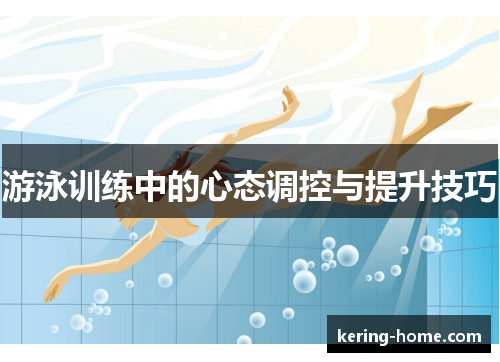游泳训练中的心态调控与提升技巧
Swimming Training: Enhancing Mental Attitude and Skills
Swimming is not merely a physical endeavor but also a mental challenge. This article explores strategies for improving mental resilience and skills in swimming training. It delves into techniques that can enhance performance by focusing on mindset, concentration, motivation, and psychological preparation. Each aspect is dissected to provide a comprehensive guide for swimmers aiming to optimize their training and competition outcomes.
1、Mindset Development
Maintaining a positive mindset is crucial in swimming, where mental fortitude often determines success. One effective approach is visualization, where swimmers mentally rehearse their races, envisioning every stroke and turn. This technique not only enhances confidence but also improves performance under pressure. Additionally, setting realistic goals helps in fostering a growth mindset, encouraging swimmers to view setbacks as opportunities for learning and improvement.
Furthermore, mindfulness practices such as deep breathing and meditation can significantly reduce anxiety and enhance focus during training and competition. By cultivating a resilient mindset, swimmers can navigate challenges with greater ease and consistency.
Developing mental toughness involves practicing perseverance and resilience in the face of adversity. Coaches play a vital role in nurturing this attribute by providing constructive feedback and creating a supportive training environment.
2、Concentration Techniques
Effective concentration is essential for maintaining peak performance throughout a swimmer's training sessions and races. One technique is chunking, where swimmers break down their races into manageable segments, focusing intensely on each part. This method prevents distractions and helps in maintaining optimal technique and pace.
KaiyunAnother concentration strategy involves establishing pre-race routines that include rituals or mental cues. These routines help swimmers enter a focused state of mind, enhancing their readiness and confidence before diving into the pool. Additionally, incorporating attention control exercises, such as focusing on specific stroke mechanics during drills, can sharpen concentration abilities over time.
Managing distractions, both internal and external, is crucial. Techniques like selective attention training can teach swimmers to filter out irrelevant stimuli and stay attuned to critical cues during races.
3、Motivation Enhancement
Motivation is the driving force behind consistent training and performance improvement. Setting both short-term and long-term goals that are specific, measurable, achievable, relevant, and time-bound (SMART goals) can boost motivation levels among swimmers. Celebrating small victories along the way reinforces positive momentum and encourages continuous effort.
Creating a supportive team environment fosters intrinsic motivation by promoting camaraderie and shared goals. Coaches can inspire motivation by highlighting individual strengths and progress, reinforcing a sense of purpose and accomplishment.

Furthermore, fostering a growth mindset encourages swimmers to view challenges as opportunities for growth rather than obstacles. This mindset shift promotes resilience and sustained motivation, even in the face of setbacks.
4、Psychological Preparation
Psychological preparation encompasses strategies that swimmers can use to manage stress and optimize performance under pressure. Implementing relaxation techniques such as progressive muscle relaxation or guided imagery sessions before races can reduce anxiety levels and enhance mental readiness.
Developing a personalized pre-race routine that includes visualization, positive self-talk, and physical warm-up routines can help swimmers enter a focused and composed state before competition. This routine primes both body and mind for peak performance.
Moreover, practicing mental rehearsal for potential race scenarios can build confidence and reduce performance anxiety. By visualizing successful outcomes and preparing for potential challenges, swimmers can approach races with a proactive mindset.
总结:
Swimming training demands not only physical prowess but also mental resilience and strategic preparation. By cultivating a positive mindset, sharpening concentration skills, enhancing motivation, and implementing effective psychological strategies, swimmers can optimize their training outcomes and achieve peak performance. These aspects work synergistically to empower swimmers to navigate challenges, maintain focus, and consistently improve their performance in competitive swimming.
Ultimately, integrating these mental strategies into training routines not only enhances performance but also fosters a deeper enjoyment and satisfaction in the sport of swimming.
巴黎游泳赛事最新投注分析与推荐指南
巴黎游泳赛事是全球游泳爱好者和投注者关注的焦点之一。在这一赛事中,选手们将争夺荣誉,展示他们的最佳状态。随着赛事的临近,了解最新的投注分析和推荐指南成为投注者决策的重要依据。本文将对巴黎游泳赛事的最新投注分析进行详细探讨,包括选手表现预测、赛道条件影响、历史数据分析以及投注策略推荐四个方面。通过这些...
WTT新加坡大满贯赛:中国组合蝉联混双冠军
**前言** 在浩瀚的乒乓球世界中,**WTT新加坡大满贯赛**作为全球顶级赛事之一,吸引了无数乒乓球爱好者和专业选手的关注。在此次赛事中,中国组合凭借卓越的实力和出众的合作默契,再次蝉联混双冠军,展示了他们在国际赛场上的强大统治力和不俗实力。本次比赛不仅是中国乒乓球队的荣耀时刻,也是值得行业内外...